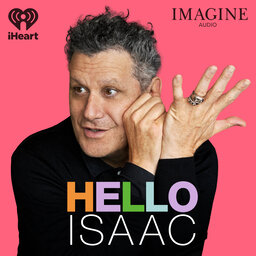Drag Superstar, BenDeLaCreme
On this episode of Hello Isaac, Isaac Mizrahi chats with BenDeLaCreme about the politics and joy of drag, RuPaul and puppets!
Follow Hello Isaac on @helloisaacpodcast on Instagram and TikTok and catch up with BenDeLaCreme on Instagram @bendelacreme.
In 1 playlist(s)
Hello Isaac with Isaac Mizrahi
Isaac Mizrahi is an expert - at almost everything! He’s an iconic fashion designer, actor, singer, …Social links
Follow podcast
Recent clips

Emmy-Winning Actor and Director, Pamela Adlon
51:37

Interior Designer & TV Host, Jeremiah Brent
49:51

Podcast Host & Crooked Media Co-Founder, Jon Lovett
50:53
 Hello Isaac with Isaac Mizrahi
Hello Isaac with Isaac Mizrahi